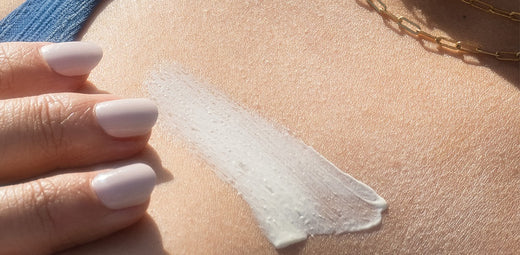
A Guide to Fair Skin Sun Protection
If you have fair skin, you know how important it is to use SPF every single day. The lighter your skin, the more likely you are to experience redness, irritation, and even burning due to sun exposure. That’s why it’s important to invest in high-quality sunscreen and other SPF products.
But what is the best sunscreen for fair skin? Our guide covers the importance of sunscreen for fair skin, ingredients to look out for, and must-have summer SPF products to keep your skin looking and feeling its best.
Why Fair Skin Needs Extra Sun Protection
SPF helps protect you from more than sunburn. Research suggests that melanoma, an aggressive form of skin cancer, is closely linked to sun exposure, with 90% of cases linked to UV radiation1.
Fair skin can be more prone to sun damage. It’s lighter because it has less of the body’s natural skin protection: melanin. That’s why fair skin typically:
- Burns easily
- Has more freckles
- Is more sensitive to the sun
It makes sense, then, that fair skin needs more TLC and protection during sunny weather. Following the right fair skin sun protection regime helps protect you from painful burns, premature aging, and the risk of cancer.
How to Choose the Best Sunscreen for Fair Skin
Knowing how to protect fair skin from the sun starts with sourcing trusted, effective sunscreen. Look for products with broad-spectrum SPF protection—protecting from both UVA and UVB solar rays—and a high SPF rating.
Best SPF Levels for Fair Skin
SPF means Sun Protection Factor, and the FDA recommends using a minimum SPF of 152, but for fair skin, SPF 15-rated sunscreen likely won’t provide the protection you need. Instead, look for SPF 30-50 rated products, ideally SPF 50+, to provide your lighter skin with the protection it needs.
The Difference Between Chemical vs. Mineral Sunscreens
Both mineral and chemical sunscreen products provide protection from the sun. However, chemical sunscreens are absorbed by the skin, whereas mineral sunscreen provides a physical layer. For sensitive and fair skin, mineral sunscreen products can be more effective because:
- They’re less likely to cause chemical-based reactions
- They’re more suitable for people with sensitive skin conditions like rosacea
Because mineral sunscreen is a physical barrier, you do have to reapply it regularly. Chemical sunscreen can be better for sports or activities where you sweat a lot or spend time in the water.
For a deeper dive into the differences between these two effective sunscreen types, read Mineral vs. Chemical Sunscreens: The Ultimate Guide to Choosing the Best for Your Skin.
Sunscreens Without White Cast
Some mineral sunscreens can leave a white cast—that faint whiteness that’s the telltale sign of heavy sunscreen application. However, many modern mineral sunscreen products utilize ingredients and formats that avoid this white residue, such as COOLA’s Zinc Oxide Sunscreen Spray. It’s non-greasy, sheer, and easy to apply, with skin-nourishing additives.
Tinted Sunscreens That Blend Well
You can also invest in beautiful tinted SPF products that blend with your own skin tone or give you that extra glow. Alternatively, get that freshly tanned look with Sunless Tan products, from serum to lotion.
How to Protect Fair Skin from the Sun Daily
Once you’ve found your ideal SPF formulas, utilize these tips to ensure you’re staying sun-safe throughout the day:
- Limit your time in the sun, especially when UV rays are strongest, usually between 10 a.m. and 2 p.m.
- Seek shade and wear protective clothing that covers your skin, including long-sleeved shirts, pants, sunglasses, and hats.
- Reapply your SPF at least every two hours, or if you're wearing water-resistant sunscreen, apply every 80 minutes after swimming, sweating, or toweling.
- Drink plenty of water to support skin health from within.
When it comes to how much sunscreen to use, a good rule of thumb is this:
- For facial sunscreen, use around 1/3 of a teaspoon, which is the size of a nickel.
- For body sunscreen, use a full ounce of sunscreen, or enough to fill a shot glass.
Common Myths About Fair Skin and Sunscreen
There's a lot of misinformation floating around about sun protection for fair skin. Let’s debunk some of the most common myths to make sure you have the most accurate sun-safety information to keep your skin healthy.
Myth: “I’m under glass, so I can’t get burned.”
While transparent glass does block UVB radiation, it allows UVA rays to pass through3. So, even if you’re sitting by a sunny window, your fair skin can still get burned
Myth: “It’s cloudy, I don’t need sunscreen.”
Clouds might block the brightness of the sun, but they don’t do such a good job at fending off UV energy. In fact, with light cloud cover, up to 90% of the sun’s ultraviolet4 energy can still reach your skin.
Myth: “A base tan protects my skin.”
Fair skin is notoriously difficult to tan, but if you’ve managed to get a summer glow, that doesn’t mean that you’re automatically protected from sun damage. Regular application of SPF is the only way to protect your skin while you’re exposed to the sun.
Sun damage can have a cumulative effect, particularly on fairer skin tones. Stay protected and avoid falling foul of common skincare and sun protection misconceptions.
Product Spotlight: COOLA Picks for Fair Skin
So, what is the best sunscreen for fair skin? Here are some of our top products to keep your skin happy this summer:
- Fragranced Zinc Oxide Sunscreen Lotion: Take the scent of Tropical Coconut everywhere this summer with SPF 30 mineral sunscreen.
- Zinc Oxide Liplux® Sunscreen Trio: Three mineral SPF 30 lip balms with just a hint of tint, combining lip nourishment, sun protection, and a splash of color.
- Clear Skin Oil-Free Moisturizer: Clinically proven to offer breakout-free sun protection while moisturizing and mitigating the effects of blue light.
With products to look after your lips, face, and body, you can enjoy the sun more confidently this summer.
FAQs About Sunscreen for Fair Skin
How much SPF should fair skin wear?
Fair skin sun protection products should be at least SPF 30 and ideally SPF 50. Look for products that offer broad-spectrum SPF.
Is mineral sunscreen better for pale skin?
In most cases, mineral sunscreen is better for fair or pale skin because it starts working immediately and is less likely to cause a negative reaction. Mineral sunscreen is usually more suitable for those with sensitive skin or conditions like rosacea.
How can I prevent sunburn if I have fair skin?
Minimize your sun exposure and wear a hat or other protective gear when you’re out in the sun for extended periods. Seek shade, and always wear an effective SPF 30-50 rated sunscreen.
Make Summer Safer for Your Fair Skin
Knowing how to protect fair skin from the sun helps you enjoy summer so much more. Bookmark our guide to bust myths about sun protection and give yourself the best chance at fun in the sun.
Discover more and browse the full COOLA range here.
Sources:
- New York State Department of Health. “Skin Cancer – Skin Cancer Statistics.” DoH, Jan. 2024, https://www.health.ny.gov/diseases/cancer/skin/
- U.S. Food & Drug Administration. “Sunscreen: How to Help Protect Your Skin from the Sun.” FDA, 16, Aug. 2024, https://www.fda.gov/drugs/understanding-over-counter-medicines/sunscreen-how-help-protect-your-skin-sun
- International Ultraviolet Association. “UV FAQs.” IUVA, 2025, https://www.iuva.org/uv-faqs
- The Weather Channel. “When It’s Cloudy, You Can Still Get A Sunburn.” Chris DeWeese, 4, June, 2025, https://weather.com/health/news/2025-06-03-un-index-cloudy-sunburn




